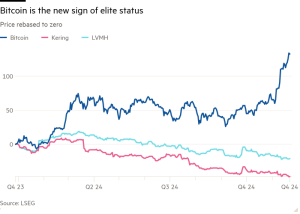how Donald Trump’s allies stand to gain from ‘anti-woke’ resurgence

A group of allies from Donald Trump’s inner circle are looking to profit from his re-election and the resurgent Maga movement in the US, with a network of companies positioned to appeal to ‘anti-woke’ and ‘values-driven’ sentiment.
This week, companies in the so-called parallel economy — a nascent ecosystem targeting consumers with conservative or Christian values — celebrated Trump’s victory as a major boon to their businesses, which to date have struggled to eke out any meaningful profits.
Backers include Wall Streeter and campaign megadonor Omeed Malik, former Republican senator Kelly Loeffler and Trump’s son Donald Trump Jr, who have financed PublicSquare, an ecommerce platform similar to Amazon or eBay for users who value “life, family and freedom”, and whose main source of revenue comes from financing gun sales.
Meanwhile, libertarian investor Peter Thiel and Trump’s own vice-president, JD Vance, were early investors in Rumble, a right-leaning challenger to YouTube. Vivek Ramaswamy, will lead, along with Elon Musk, Trump’s government efficiency effort while also running his asset management firm, Strive Asset Management, which is anti-environmental, social and governance (ESG) principles.
For the publicly traded companies, there is hope Trump’s victory will help them do something the Joe Biden years have not: turn a profit. After years of dwindling sales and hefty losses, the companies, which position themselves as alternatives to “woke” corporate America, are banking on a reversal of fortunes, potentially providing windfalls for their Maga-aligned investors.
“I was proven correct that there were enough people who felt the way we were talking about from a political and cultural standpoint,” said Malik, who is the chair of PublicSquare and founder of 1789 Capital, his anti-ESG investment firm. “It is an open question if they feel that way economically and whether the political movement will translate into commerce, but I believe it will.”

On an earnings call on Tuesday, Chris Pavlovski, chief executive of Rumble, said he had “never been more optimistic about our opportunity”, adding: “Cancel culture is dead. Free speech is now mainstream. And Rumble is in the driver’s seat.”
Rumble went public in 2022 via a deal with a blank-cheque company backed by Cantor Fitzgerald, the Wall Street group run by Howard Lutnick, the billionaire. Lutnick, the Trump transition co-chair, is jockeying for Treasury secretary in the incoming administration.
Michael Seifert, the chief executive of PublicSquare, said: “We get to be the economic manifestation of the electoral victory that took place last week, and we have already seen that drive growth for our business even in the past seven days.”
Advocates argue the parallel economy still has billions of dollars of untapped potential markets, and support sectors believed to be capital-starved because of ESG principles — such as guns and ammunition. They also say that given Trump won more votes this year than in his first election, the number of potential consumers these companies might appeal to is expanding.
“With Trump in office, many of these platforms will become more institutionalised,” said Sam Woolley, associate professor in communication at the University of Pittsburgh. “They will become part of the system rather than on the outskirts of the system.”
But, he added: “Many platforms are seen as being too political or too unfettered thus having the litany of problems that come with that.”
Carolyn Schmitt, an academic who tracks several dozen parallel economy groups, said “on the left this type of values-driven purchasing has been going on for a long time”. However, on the right, the parallel economy has grown as a “reactionary” response to perceived “cancel culture”, and has been closely linked with electoral politics.
This week it emerged Donald Trump Jr has chosen to join Malik’s 1789 Capital rather than being part of his father’s team in the White House. The firm, founded in 2022, has one listed investment on private markets database PitchBook: Tucker Carlson Network, the streaming platform set up by the rightwing pundit.
“We see this convergence between these business ventures and the people tied to Donald Trump and elected officials,” Schmitt said.

However, companies in the space have struggled to build sustainable business models. They are dependent on niche user bases and do not have the deep pockets of Silicon Valley, already leading to casualties.
In 2022, “anti-woke” bank GloriFi, backed by Thiel, closed down after just three months in operation. Parlement Technologies, the parent of Twitter alternative Parler, which was backed by Republican megadonor Rebekah Mercer, sold the app in 2023 before filing for bankruptcy earlier this year.
Experts say the monetisation approach of the surviving bigger groups to date has been scattergun.
PublicSquare, for example, gets the bulk of its revenue as a sort-of Klarna-like fintech for guns, which some have dubbed “shoot now, pay later”. The firm acquired anti-abortion nappy brand Everylife last year, which was co-founded by Republican strategist Nick Ayers.
The company’s namesake online marketplace offers everything from US-made home goods and health supplements, to joggers with hidden pockets for concealed weapons and models of civil war soldiers waving confederate flags. It generated about $800,000 in revenue in the company’s third quarter, or less than 15 per cent of its overall sales.

Strive’s first investment offering, an energy ETF with the ticker DRLL, pushed what it called a “post-ESG” mandate by investing in US fossil fuel companies. Including fees, the fund has underperformed its own benchmark over the past 12 months and since inception, according to the firm’s fact sheet.
Rumble runs advertising, offers cloud services and has launched its own brands including Be Naked, a male wellness brand that offers supplements promising “primal strength”, and 5G Free, which it says offers “electromagnetic field (EMF) wellness”.
Despite their bullish outlook and belief that Trump’s recent victory is a justification of their business model, shares in PublicSquare and Rumble have this week fallen about 20 per cent and 15 per cent respectively following their quarterly results that included heavy losses.
PublicSquare said its sales in the first nine months of this year have grown to nearly $16mn, up from just under $3mn a year ago. But in order to generate that growth, the company spent $14mn on marketing and another $33mn on salaries and other administrative expenses. In all, the company lost $37mn in the first nine months of the year, or roughly $2.30 for every dollar it generated in sales.
Rumble, which is popular among Trump’s base but major advertisers have avoided it because of its hands-off approach to moderation, posted $25mn in third-quarter revenues, which was up from $18mn year-on-year, but missed Wall Street expectations of a rise to $29mn. At $31.5mn, losses were also wider than the $25.2mn anticipated.

Old Glory Bank, an Oklahoma-based “pro-America” online lender that was founded four years ago by former Trump administration official Ben Carson, country music star John Rich and others, said it had a rush of account openings in the week following the election.
“We won at the ballot box,” said Old Glory Bank chief executive and Trump supporter Mike Ring. “These same customers are now saying we are going to vote for the freedom economy with our dollars.”
Silicon Valley Big Tech executives more broadly have embraced Trump this election, seeking to rebuild bridges with him after facing regulatory probes and antitrust threats during Biden’s administration.
George Farmer, former chief executive of Parler, said a shift among the America First movement to “shop their values” was becoming more entrenched, but noted that “if [mainstream] companies get comfortable with Trump, that lessens the necessity argument for the parallel economy”.
#Donald #Trumps #allies #stand #gain #antiwoke #resurgence






